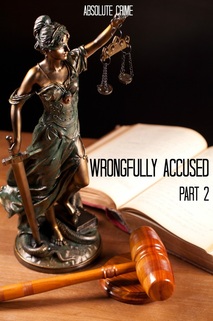Wrongfully Accused Part 2: 15 People Sentenced to Prison for a Crime They Didn't Commit

Absolute Crime's bestselling series is back with a brand new anthology of 15 more people wrongfully accused of crimes.
Justice is blind…but it’s not perfect. Everyday, people are convicted or accused of crimes they did not commit. Sometimes the accusations are racially motivated, sometimes they are profiled for the clothes they wear, and sometimes they are just at the wrong place at the wrong time.
The 15 people in this book all share one thing in common: they are innocent, but still sent to prison. You will never look at a court room the same way again!
Justice is blind…but it’s not perfect. Everyday, people are convicted or accused of crimes they did not commit. Sometimes the accusations are racially motivated, sometimes they are profiled for the clothes they wear, and sometimes they are just at the wrong place at the wrong time.
The 15 people in this book all share one thing in common: they are innocent, but still sent to prison. You will never look at a court room the same way again!
Buy Now!
Wrongfully Accused PDF and ePub |
Excerpt
Introduction
Wrongful accusations are among the most frightening things to happen in our modern justice system. An innocent person can get accused of a crime he or she didn’t commit, and is then arrested, charged, tried, convicted, imprisoned, and sometimes executed for it.
These are often made far worse by miscarriages of justice, such as lousy police work, lying witnesses, false confessions, bad lawyering, and questionable evidence. What’s most frightening is that these miscarriages of justices occur in all nations, including countries with excellent court systems such as the United States and Great Britain. Worse, wrongful accusations can occur to anybody, including hardworking and law abiding citizens with good jobs.
Nobody is safe from wrongful accusations, and only those with a lot of money and a really good lawyer seem to be able to escape its effects. Accusations such as those described in this book are among the biggest problems affecting the justice system throughout the world. They need to be stamped out because they can happen to anybody, anywhere.
Barry George
Barry George was probably convicted of one of the most high profile crimes in recent British history because he liked to associate himself with celebrities. George also had one of the strangest alibis of all time – he claimed he was stalking another woman at the time of a murder.
The British people were shocked on April 26, 1999, when prominent BBC TV journalist Jill Dando was gunned down on her own doorstep in Fulham, West London. Dando had been a presenter (or anchorwoman) on several prominent BBC News programs, including the very popular Breakfast Time and the Six O’clock News.
The murder was made all the more horrifying by the fact that no motive or suspect came out. The case remained unsolved for over a year until Scotland Yard began looking over cold files and information about suspects. The detectives soon singled out a decidedly unusual suspect, an Irish immigrant named Barry George.
The Loner Barry George was a character who also lived in Fulham. At various times in his life, George had claimed to be a decorated member of the elite British commando unit, the Special Air Services (or SAS), and a cousin of Freddie Mercury of the legendary rock group Queen. None of this was true, but it didn’t stop George from pretending. George also had the habit of using the alias Barry Bulsara, which is Freddie Mercury’s real name.
George had other unusual hobbies. He liked to stalk women, and he collected large amounts of information about famous women he saw on TV. George lived alone in a flat in Fulham not far from Dando’s house. His appearance also matched a computer-generated picture of a man witnesses had seen near the home at the time of the murder.
Police didn’t find any evidence that George had killed Dando or any motive. They also didn’t find a gun or ammunition in his flat. Yet Dando was arrested and charged with the crime. They did find pictures of guns and evidence that George was interested in them. Handguns are illegal in Britain and hard to obtain.
Convicted by a Microscopic Particle Incredibly, the major evidence used against Barry George was a microscopic particle. Investigators found a tiny speck of dust on George’s jacket that they identified as Firearms Discharge Residue. Such particles are given off every time a gun is fired.
The problem with this evidence was that it could have come from any gun. There was no evidence that it could have come from the weapon that killed Jill Dando. George’s lawyers argued that the particle could have come from any gun that was exposed to their client, including those carried by the police constables that arrested him. Despite what Americans believe, many British police, including detectives, often carry handguns.
The particle, which was called a speck, was what convinced a jury that George had committed the murder. The jury may have also been offended by the defense’s claims that the Serbian government (or Serbian terrorists) had assassinated Dando in retaliation for her work on behalf of refugees from Kosovo. George was convicted and sentenced to life in prison based on the speck.
Cleared by the BBC Ironically enough, it was Jill Dando’s old employer, the BBC, which helped clear George. Journalists for the BBC program Panorama started looking into the case in 2007 and started talking to forensic scientists.
Their questions led the Forensic Science Service, the British equivalent of the FBI’s crime laboratory, to reexamine the speck. The service’s own scientists determined that the speck was of no value as evidence.
This prompted the Criminal Cases Review Commission, which reviews possible miscarriages of justice in Britain, to rule that too much weight was put on the evidence. The Court of Appeal then overturned George’s conviction and ordered a retrial.
Without the speck, the jury at the new trial found George not guilty, which allowed him to walk free. George later tried to sue the government for compensation, but his effort failed.
The Mystery Continues Barry George apparently still lives in London, and it isn’t known if he still claims to be Freddie Mercury’s cousin or an SAS commando anymore. After the trial, it was determined he was mentally ill and had an IQ of 75.
The murder of Jill Dando has never been solved. Since George’s acquittal, there has been much speculation in the press that his barrister’s claims about the Serbian hit man were true.
Barry George, it seems, may have been a victim of his own behavior as much as a miscarriage of justice. His strange ways and bizarre actions were probably what led the jury to convict him. His case also proves that modern forensics evidence is far from reliable and can lead to wrongful accusations.
Bibliography BBC News. "Profile: Barry George." 1 August 2008. news.bbc.co.uk. BBC News Feature. 7 July 2013.
—. "Timeline: Jill Dando murder." 1 August 2008. news.bbc.co.uk. BBC News Feature. 7 July 2013.
Joyce, Julian. "The speck that convicted George." 7 November 2007. news.bbc.co.uk. BBC Feature Article. 7 July 2013.
Laville, Sandra. "Six years on, evidence that helped convict TV presenter's murderer is deemed valueless." 21 June 2007. guardian.co.uk. Guardian Newspaper Article. 7 July 2013.
Sky News. "George Cleared of Dando Murder." 1 August 2008. news.sky.com. Sky News Article. 7 July 2013.
Sturcke, James. "Barry George cleared of Jill Dando murder after retrial." 1 August 2008. guardian.co.uk. Guardian Newspaper Article. 7 July 2013.
Wikipedia. "Jill Dando." n.d. en.wikipedia.org. Online Encyclopedia Entry. 7 July 2013.
Wrongful accusations are among the most frightening things to happen in our modern justice system. An innocent person can get accused of a crime he or she didn’t commit, and is then arrested, charged, tried, convicted, imprisoned, and sometimes executed for it.
These are often made far worse by miscarriages of justice, such as lousy police work, lying witnesses, false confessions, bad lawyering, and questionable evidence. What’s most frightening is that these miscarriages of justices occur in all nations, including countries with excellent court systems such as the United States and Great Britain. Worse, wrongful accusations can occur to anybody, including hardworking and law abiding citizens with good jobs.
Nobody is safe from wrongful accusations, and only those with a lot of money and a really good lawyer seem to be able to escape its effects. Accusations such as those described in this book are among the biggest problems affecting the justice system throughout the world. They need to be stamped out because they can happen to anybody, anywhere.
Barry George
Barry George was probably convicted of one of the most high profile crimes in recent British history because he liked to associate himself with celebrities. George also had one of the strangest alibis of all time – he claimed he was stalking another woman at the time of a murder.
The British people were shocked on April 26, 1999, when prominent BBC TV journalist Jill Dando was gunned down on her own doorstep in Fulham, West London. Dando had been a presenter (or anchorwoman) on several prominent BBC News programs, including the very popular Breakfast Time and the Six O’clock News.
The murder was made all the more horrifying by the fact that no motive or suspect came out. The case remained unsolved for over a year until Scotland Yard began looking over cold files and information about suspects. The detectives soon singled out a decidedly unusual suspect, an Irish immigrant named Barry George.
The Loner Barry George was a character who also lived in Fulham. At various times in his life, George had claimed to be a decorated member of the elite British commando unit, the Special Air Services (or SAS), and a cousin of Freddie Mercury of the legendary rock group Queen. None of this was true, but it didn’t stop George from pretending. George also had the habit of using the alias Barry Bulsara, which is Freddie Mercury’s real name.
George had other unusual hobbies. He liked to stalk women, and he collected large amounts of information about famous women he saw on TV. George lived alone in a flat in Fulham not far from Dando’s house. His appearance also matched a computer-generated picture of a man witnesses had seen near the home at the time of the murder.
Police didn’t find any evidence that George had killed Dando or any motive. They also didn’t find a gun or ammunition in his flat. Yet Dando was arrested and charged with the crime. They did find pictures of guns and evidence that George was interested in them. Handguns are illegal in Britain and hard to obtain.
Convicted by a Microscopic Particle Incredibly, the major evidence used against Barry George was a microscopic particle. Investigators found a tiny speck of dust on George’s jacket that they identified as Firearms Discharge Residue. Such particles are given off every time a gun is fired.
The problem with this evidence was that it could have come from any gun. There was no evidence that it could have come from the weapon that killed Jill Dando. George’s lawyers argued that the particle could have come from any gun that was exposed to their client, including those carried by the police constables that arrested him. Despite what Americans believe, many British police, including detectives, often carry handguns.
The particle, which was called a speck, was what convinced a jury that George had committed the murder. The jury may have also been offended by the defense’s claims that the Serbian government (or Serbian terrorists) had assassinated Dando in retaliation for her work on behalf of refugees from Kosovo. George was convicted and sentenced to life in prison based on the speck.
Cleared by the BBC Ironically enough, it was Jill Dando’s old employer, the BBC, which helped clear George. Journalists for the BBC program Panorama started looking into the case in 2007 and started talking to forensic scientists.
Their questions led the Forensic Science Service, the British equivalent of the FBI’s crime laboratory, to reexamine the speck. The service’s own scientists determined that the speck was of no value as evidence.
This prompted the Criminal Cases Review Commission, which reviews possible miscarriages of justice in Britain, to rule that too much weight was put on the evidence. The Court of Appeal then overturned George’s conviction and ordered a retrial.
Without the speck, the jury at the new trial found George not guilty, which allowed him to walk free. George later tried to sue the government for compensation, but his effort failed.
The Mystery Continues Barry George apparently still lives in London, and it isn’t known if he still claims to be Freddie Mercury’s cousin or an SAS commando anymore. After the trial, it was determined he was mentally ill and had an IQ of 75.
The murder of Jill Dando has never been solved. Since George’s acquittal, there has been much speculation in the press that his barrister’s claims about the Serbian hit man were true.
Barry George, it seems, may have been a victim of his own behavior as much as a miscarriage of justice. His strange ways and bizarre actions were probably what led the jury to convict him. His case also proves that modern forensics evidence is far from reliable and can lead to wrongful accusations.
Bibliography BBC News. "Profile: Barry George." 1 August 2008. news.bbc.co.uk. BBC News Feature. 7 July 2013.
—. "Timeline: Jill Dando murder." 1 August 2008. news.bbc.co.uk. BBC News Feature. 7 July 2013.
Joyce, Julian. "The speck that convicted George." 7 November 2007. news.bbc.co.uk. BBC Feature Article. 7 July 2013.
Laville, Sandra. "Six years on, evidence that helped convict TV presenter's murderer is deemed valueless." 21 June 2007. guardian.co.uk. Guardian Newspaper Article. 7 July 2013.
Sky News. "George Cleared of Dando Murder." 1 August 2008. news.sky.com. Sky News Article. 7 July 2013.
Sturcke, James. "Barry George cleared of Jill Dando murder after retrial." 1 August 2008. guardian.co.uk. Guardian Newspaper Article. 7 July 2013.
Wikipedia. "Jill Dando." n.d. en.wikipedia.org. Online Encyclopedia Entry. 7 July 2013.








